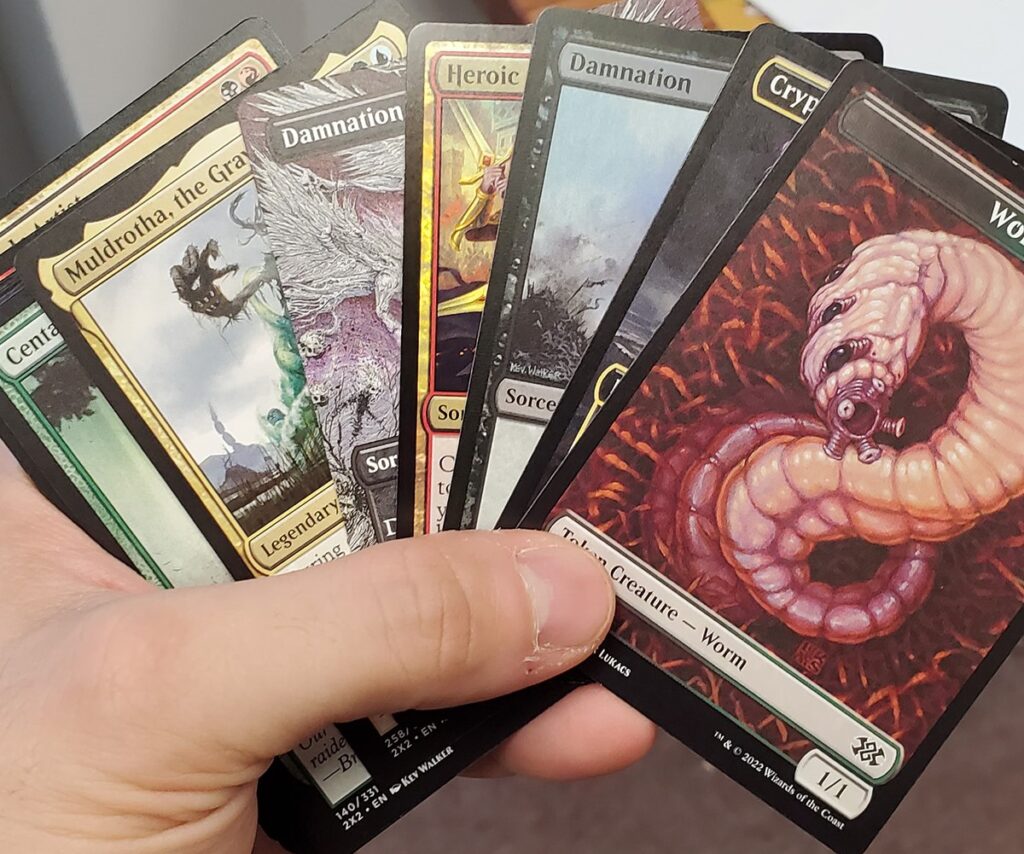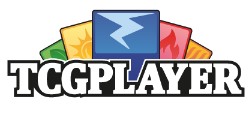Once you’re hooked on Magic: The Gathering (MTG), there’s nothing that feels as good as getting new cards. Whether from packs, the local card shop, or in the mail, the anticipation and unexplored strategic possibilities never fail to get me pumped to tune decks and jam some games to test out my changes.
These days, I generally steer clear of most booster packs and boxes in favor of just buying the single cards I need. You lose out on the thrill of cracking packs in search of a set’s chase cards, but your odds of actually pulling what you want from a single MTG pack are quite low, and even a whole booster box offers no guarantees.

In the long run, this will save you a ton of money, but there’s no getting around the fact that a lot of MTG cards carry high price tags on the secondary market due to their power level, rarity within a set, and overall scarcity in the market or reprint potential (typically caused by the Reserved List, but not always).
This makes getting the most cards for your money extremely important as you start to pursue cards with 2, 3, or even 4 figures in their price tag, as a 10% difference in price actually can add up to significant money rather quickly.
Since I already like bargain hunting, putting together a list of reliable sellers to compare card prices was a no-brainer. Today, I’m here to share my years of findings and experiences to help you save enough to get that last card on your wish list you really wanted to buy, but your budget just wasn’t going to allow.
Your Local Game Store (LGS)
If you need a specific card right away or want to thoroughly inspect a card’s condition before purchasing it, your LGS is usually going to have a much wider selection of cards to look through than your playgroup’s various collections.
That said, there are pros and cons to dealing with card shops, and your experience will vary from shop to shop as with any business.
First, your LGS is probably one of the only public meeting places available for tournaments and free play with your local MTG community. Giving your business to them instead of an online retailer helps them keep the lights on and continue to provide these services.
While it might feel like one customer’s business won’t make a difference, trust me when I say it almost always does. Profit margins on a lot of products your LGS sells aren’t as high as you think, and the recent price increases inflicted on MTG sealed products haven’t exactly helped this situation.
If your LGS deals in MTG singles, this is one of the areas where they can make decent money as they usually buy cards at a percentage of their value (usually 50-60%) before selling them to you at their value.
Sure, the market fluctuates, but that’s still going to be head and shoulders above most products for them in terms of profit. You also get the cards you need on the spot, creating a win-win for both parties.
Unfortunately, this is where a common drawback comes in, and that’s how your shop determines a card’s value. Most common metrics for this, such as TCGPlayer market price, the pricing of a big retailer like Star City Games, or CrystalCommerce’s automatic pricing always end up being at least a little more expensive than your best online option.
This can be mitigated by the fact that if an LGS deals in singles, you can usually trade in cards you can’t otherwise trade away or don’t wish to sell online for store credit, but there’s no getting around the fact that you’ll almost always be paying a little extra for the convenience of working with your LGS on both sides of that trade.
Finally, most local game stores simply aren’t going to have as wide a selection of cards as some of the online marketplaces, especially in smaller towns or cities with smaller MTG communities.
Fortunately, almost every shop I’ve worked with has been more than willing to order cards they don’t have for you if asked, and that can be a lifesaver if you need a knowledgeable go-between you can trust to order online for you.
TCGPlayer

If you’re ordering MTG cards online, TCGPlayer is usually the first place you want to go to get a feel for a card’s price on the secondary market. There are a ton of different sellers for virtually any card you could possibly want, and they frequently compete to offer the lowest price, creating an ideal environment for buyers.
Best of all, if you end up buying from a seller who doesn’t come through, TCGPlayer’s support staff has always been committed to promoting a positive buyer experience.
While they will always encourage you to try and work with a seller first, they’re proactive about addressing sellers who prove to be problematic, sometimes reaching out to you before you know there’s a problem!
Fortunately, these situations have been relatively rare for me over the last several years, and they have a good, consistent condition guide that I’ve personally used as the standard for grading my own cards for a long time selling across multiple websites. You almost always get what you’re looking for, and sometimes a card’s condition is better than expected!
There are two consistent issues I run into with TCGPlayer currently, however, and while neither is a dealbreaker, they’re worth noting so you aren’t caught off guard. First, there isn’t a shipping standard for cards sent out by sellers other than “make sure it arrives to the customer’s mailbox safely”.
While some sellers use bubble mailers and toploaders to ship cards, as is good practice (though plain white envelopes can also work if packed with a piece of paper), I’ve also gotten a lot of terribly shipped cards from inexperienced or cheap sellers.
This can result in cards being damaged in transit, which while usually easy to resolve, is annoying when it comes up. Some sellers are also slow to ship, which can result in envelopes trickling in over the course of 2-3 weeks after a big order.
If this is more hassle than you’re willing to deal with, you can usually avoid these issues by using TCGPlayer Direct, which collects cards from sellers and simply ships them in one package, and will even do so for free if your Direct order reaches $50.
The other primary issue I’ve seen with TCGPlayer, particularly starting in 2022, is how heavily they’ve leaned on their subscription service to gatekeep order kickbacks that used to be open to everyone.
This is probably a result of them acquiring ChannelFireball and then in turn being acquired by eBay, but it has made me wary of their future business practices in a way I have never had to be before. Doesn’t stop me from doing business with them right now, but I certainly shop around more than I used to as a result.
eBay

eBay is usually my Hail Mary for a better deal on a card that I feel is either obscure, overpriced, or both. In most cases, MTG cards are more expensive on eBay than TCGPlayer due to the higher fees eBay imposes on sellers, but sometimes you’ll find a diamond in the rough.
Maybe it’s an independent collector looking to quickly move something expensive, maybe a bigger seller is offering a good price on a playset of cards instead of single copies, perhaps someone misspelled their listing and it just isn’t getting attention as a result.
No matter the reason, it’s worth the extra browser tab to quickly see if there’s a deal before checking out elsewhere.
Like TCGPlayer, eBay is very buyer-focused, sometimes even unfairly so. The burden of proof is always placed on the seller in an eBay transaction, especially when PayPal is involved, and unless they have dotted every i and crossed every t in eBay’s and PayPal’s terms, the seller usually loses a dispute if the buyer has anything remotely resembling a reasonable complaint.
Naturally, immoral buyers have taken advantage of this to scam sellers, but if you’re tempted to do the same, I’d strongly recommend against it. There are blacklists that circulate among bigger MTG sellers to stop known scammers or buyers deemed too annoying to work with from interacting with their auctions, and it’s very easy to end up on such a list if you’re obnoxious.
Finally, eBay sometimes does promotions for eBay Bucks, a kickback program where you receive credit for future purchases based on how much you buy. Typical emails are for 5% (sometimes more), and then you can spend your Bucks within the next 12 months. Check your email to make sure you apply any available promotions before purchasing!
Card Kingdom

Card Kingdom is usually my other Hail Mary when doing price checking for obscure cards. They’re almost always notably more expensive than TCGPlayer on anything of value, but occasionally you’ll find a good deal on something you’re looking for.
Unlike eBay and TCGPlayer, however, Card Kingdom does have a niche that I recommend for anyone, and that’s low end cards or tokens. Their prices on these are usually good, if not the best, after factoring in shipping costs, and they offer free domestic shipping on orders over $35.
Their customer service is also a pleasure to work with, your cards arrive in good time, and you get what you pay for. I’ve never had a bad experience with Card Kingdom, so if you are looking for a good big box card shop to do business with, this is the one I always recommend when buying a bunch of $5 or less cards.
Facebook MTG Groups

Honestly, this is the only thing I think Facebook is good for anymore. MTG buy, sell, and trade groups on Facebook have all but replaced trading on forums like MTGSalvation or Pojo for the last several years, and it’s a great way to find excellent deals on cards – if you know how to navigate the environment.
First, you need to make sure the seller you’re thinking about buying a card from is reputable. Most trade groups allow sellers to create reference threads for successful transactions, and there are also MTG reference groups that exclusively offer this option. While these aren’t foolproof, they can give you a sense for a seller’s character with minimal research.
Second, always pay for your transactions using Paypal’s Goods and Services option. The extra 3% you pay provides complete protection for your transaction as a buyer, and since you’re usually saving 10% or more off TCGPlayer’s lowest price when browsing a reputable sales group, you’re still saving money overall.
Finally, if you’re looking to buy from a seller, be vigilant about responding to direct messages. If you want to see some closer pictures of a card, don’t be afraid to ask, but don’t put the seller through the work of taking them and then ghost them either – it’s just rude. Ditto for price negotiations.
Most sellers also won’t hold cards, so responding quickly is extremely important for ensuring you’re able to close a deal if you’re interested in one or more cards they’re selling.
MTG Sick Deals and the High End group have been my go-tos for years, as both are run well, are active, and have a lot of good sellers that ship quickly and reliably. I periodically even see industry professionals on these groups, so they must be doing something right!
Cardmarket (formerly MagicCardMarket)
Note: CardMarket is only available to those with access to European addresses. For a quick reference of countries Cardmarket sellers can send to, go here.

The prices for MTG singles in Europe are often notably lower than those in North and South America, making Cardmarket an ideal place to find excellent MTG card prices for those who live in Europe or have access to a European address.
Being based in the United States, I’ve only gotten to use Cardmarket a couple times with the help of a contact in Europe, but my experiences were both positive and their prices were unbeatable. It’s easy to get information on a card’s condition, location, and language, and like TCGPlayer, there are a lot of sellers on the platform.
Seller expectations are also quite precise and clear, which is incredibly refreshing. There’s still an emphasis on buyer satisfaction, but guidelines are also laid out to ensure a seller isn’t completely on the hook for a slight error.
Definitely a first stop when shopping for MTG cards if you have the option. If you work through a middleman like I have, the tradeoff for getting a card shipped safely across the globe is going to be a long timeframe – sometimes even a couple months. Global shipping also isn’t cheap, so be prepared to spend a little more or wait a bit to have cards shipped to you in batches.
Which Place Has The Cheapest MTG Cards?
Depending on what you’re looking for, the answer to this question could be any of the above stores or websites. On occasion, it might be somewhere else entirely! There are a ton of different stores and websites that sell MTG cards, but local game stores, TCGPlayer, eBay, Card Kingdom, Facebook, and CardMarket are consistently the best places to get good deals.
Each of these places also has proven to be consistent and reliable in addition to cost-effective, which are often traits that are as or more important than the price you pay for individual cards. For a quick summary of where each location excels and comes up short, however, you can refer to this cheatsheet.
| Store | Typical Strengths | Typical Weaknesses |
|---|---|---|
| Local Game Store | On Demand Cards & Inspection, Local Business | Card Selection (varies), Price (varies) |
| TCGPlayer | Card Selection, Price, Buyer Protection | Paywalled Kickbacks, Shipping Variance |
| eBay | Card Selection, Buyer Protection, Kickbacks via eBay Bucks | Price, Shipping Variance |
| Card Kingdom | Card Selection, Shipping Quality & Speed, Price (low end) | Price (mid end & high end) |
| Price, Buyer Protection (PayPal) | Card Selection, Shipping Variance | |
| CardMarket | Price, Buyer Focused | Location (Europe only), Shipping Variance |
Despite the pros and cons of each storefront, if you take a few minutes to explore all the different options available to you when shopping, you’ll be surprised by how much money you can save, which can then be spent on more Magic cards!
Other MTG Articles You Might Enjoy
- PSA, BGS, and CGC Card Grading Cost
- Multicolor MTG Mana Ramp for Commander
- How Does Spelltable Work?
- What is untap.in
- Best Mana Rocks EDH
- MTG Best Dual Lands for Commander
Braden is a founder of Assorted Meeples and has been a gamer & writer with a vivid imagination all his life. Don’t believe us? Check out his excitement when meeting Goosebumps author R.L. Stine as a kid! An avid Magic: The Gathering spellslinger for over 15 years, you can always convince him to shuffle up for a game (or three!) of Commander.
